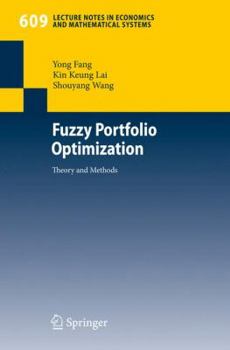Fuzzy Portfolio Optimization: Theory and Methods
Most of the existing portfolio selection models are based on the probability theory. Though they often deal with the uncertainty via probabilistic - proaches, we have to mention that the probabilistic approaches only partly capture the reality. Some other techniques have also been applied to handle the uncertainty of the ?nancial markets, for instance, the fuzzy set theory [Zadeh (1965)]. In reality, many events with fuzziness are characterized by probabilistic approaches, although they are not random events. The fuzzy set theory has been widely used to solve many practical problems, including ?nancial risk management. By using fuzzy mathematical approaches, quan- tative analysis, qualitative analysis, the experts' knowledge and the investors' subjective opinions can be better integrated into a portfolio selection model. The contents of this book mainly comprise of the authors' research results for fuzzy portfolio selection problems in recent years. In addition, in the book, the authors will also introduce some other important progress in the ?eld of fuzzy portfolio optimization. Some fundamental issues and problems of po- folioselectionhavebeenstudiedsystematicallyandextensivelybytheauthors to apply fuzzy systems theory and optimization methods. A new framework for investment analysis is presented in this book. A series of portfolio sel- tion models are given and some of them might be more e?cient for practical applications. Some application examples are given to illustrate these models by using real data from the Chinese securities markets.
Format:Paperback
Language:English
ISBN:3540779256
ISBN13:9783540779254
Release Date:May 2008
Publisher:Springer
Length:176 Pages
Weight:0.60 lbs.
Dimensions:0.4" x 6.1" x 9.2"
Customer Reviews
0 rating





